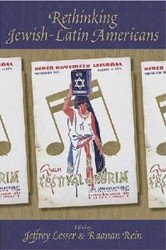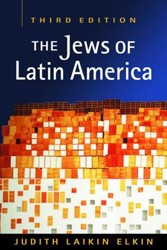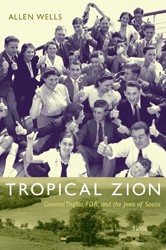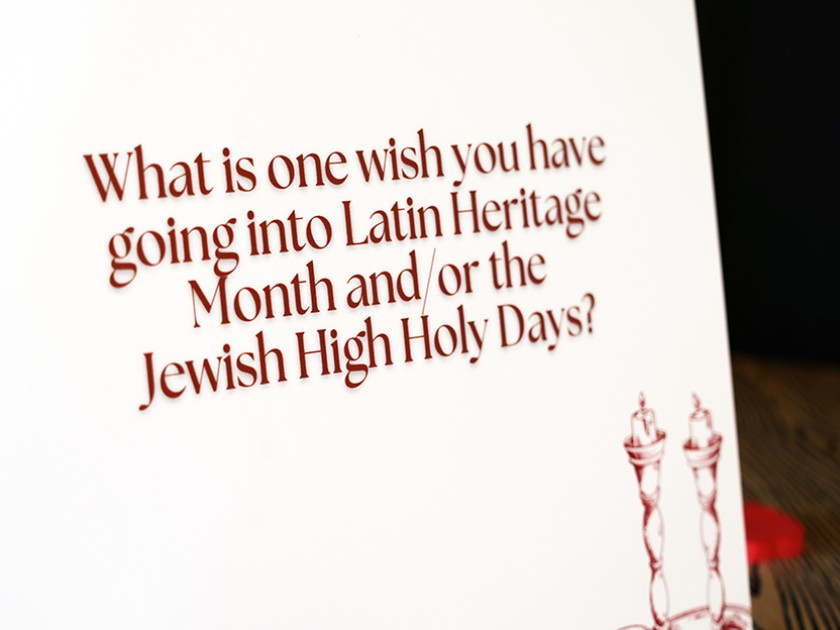
Photo credit: Valeria Moonch LLC.
One of the questions we’re often asked at Jewtina y Co. is why Latin Heritage Month begins on September 15th, rather than September 1st. The date commemorates the first of several dates of independence for various Latin American countries; beginning with Costa Rica, El Salvador, Guatemala, Honduras, and Nicaragua, and followed by Mexico, Chile, and Belize.
These independence dates hold particular resonance for the Jewish Latin American experience, where themes of liberation and belonging deeply intertwine. Our stories — which commemorate independence, reckon with centuries of colonization, and sift through complex family migration tales — speak to the nuanced and expansive canon of Latin American and Jewish literature. They are as much told through the lens of wanderers through a desert, seeking a promised land, as they are through songs and yearnings for a gentle breeze through a palma on a sticky summer evening. The parallels and unique experience of being both Latin American and Jewish illuminate the diversity of global Jewish peoplehood.
To celebrate and commemorate the significant cultural, societal, and economic contributions of Latin Americans to the United States, here are some titles by Latin Jewish authors, who share their stories of belonging, identity, history, modernity, and relationship to geography and land.
In this selection of books by Latin Jewish authors , we offer you a chance to travel the expanse of Argentina in search of long-lost family ties with Jordan Salama in Stranger in the Desert or to explore the complexity of holding multiple identities with Sonia Daccarett in her riveting memoir, The Roots of the Guava Tree. In an upcoming release, With A Needle and Thread: A Jewish Folktale from Cuba, Jennifer Stempel explores imagination through the eyes of a child in Cuba. Ruth Behar takes us across centuries and oceans, weaving a moving story of displacement, migration, and yearning for home and family in Across So Many Seas. With humor, Tamara Yajia, poignantly shares the absurdity of modern identity in Cry for Me, Argentina: My Life as a Failed Child Star, whereas, Ilan Stavans travels back in time to pre-Hispanic Mexico exploring the legacy of Nezahualcóyotl through poems in Lamentations of Nezahualcóyotl: Nahuatl Poems. He also provides the introduction to the first-of-its-kind anthology of poetry, I Am of the Tribe of Judah: Poems from Jewish Latin America (edited by Stephen A. Sadow). Nuestra América: My Family in the Vertigo of Translation by Claudio Lomnitz grounds us in the confluence of circumstances that saw Jews flee to Latin American countries in the 20th century. And finally, in A Flower Traveled in My Blood, Haley Cohen Gilliland firmly reminds us that Latin American history is Jewish history.
¡Feliz Mes de la Herencia Latina!

A Flower Traveled in My Blood: The Incredible True Story of the Grandmothers Who Fought to Find a Stolen Generation of Children by Haley Cohen Gilliland
“A remarkable new talent in narrative nonfiction delivers the epic true story of a group of courageous grandmothers who fought to find their grandchildren who were stolen.” — From the publisher
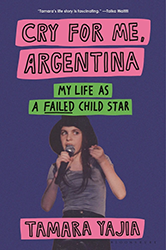
Cry for Me, Argentina: My Life As a Failed Child Star by Tamara Yajia
“Yajia belts her own version at the top of her lungs: Cry because she was forced to leave her country not once but twice. Cry because no one seemed to listen to what she needed. Cry because everything collapses. And when all else fails, she writes, turning pain into laughter, grief into comedy, and trauma into a heady cocktail of sex, drugs, failure, fractured friendships, intense Judaism, family absurdities, mixed languages, and crossed hemispheres.” — Jessica Ruetter
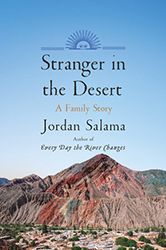
Stranger in the Desert by Jordan Salama
“One Thanksgiving, when Salama was in college, he discovered a book about his family history, called Historia Antigua, that had been compiled and written by his grandfather. Salama’s family immigrated to Argentina in the 1920s. His great-grandfather worked as a traveling salesman, and claimed to have left descendants — referred to as the lost Salamas — across the Andes. The author of our book decides to travel across Latin America in search of these relatives. It’s a journey of self-discovery that provides an intriguing description of Jewish life in Argentina.” — Marian Stoltz-Loike

The Roots of the Guava Tree: Growing Up Jewish and Arab in Colombia by Sonia Daccarett
“A debut contemporary memoir about a young woman struggling to understand her identity as the daughter of a Jewish mother and Christian Palestinian father, coming of age in Colombia as increasing violence and the instability of the 1980s engulf her country.” — From the publisher
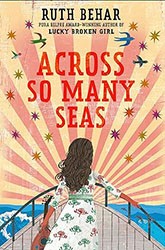
Across So Many Seas by Ruth Behar
“In 1492, Benvenida and her family emigrate from Spain and settle first in Italy, then in Turkey. In 1923, Reina, a twelve-year-old girl who is part of Turkey’s long-established Jewish community, is sent to live in Cuba when she fails to conform to her community’s standards. The novel then touches on Cuban Jews’ experience and their lives as exiles in the United States, with stories set in 1961 and 2003. Reina’s daughter, Alegra, enthusiastically supports Castro’s revolution until she realizes its contradictions and its impact on her own life. And when Paloma, Alegra’s daughter, travels to Spain with her parents and grandmother, the history of Sephardic exile and renewal comes full circle.” — Emily Schneider
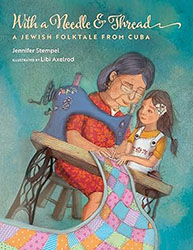
With a Needle and Thread: A Jewish Folktale from Cuba by Jennifer Stempel (illus. Libi Axelrod, trans. Lawrence Schimel)
“Romi lives with her abuelita in the small Jewish community in Santiago de Cuba. They don’t have much here, but with a little imagination and lo que sea, they’ll make it work– so an outgrown dress becomes a blanket becomes a prayer tallis becomes a wedding chuppah and ultimately becomes a symbol at the center of this community’s celebrations. Author, Jennifer Stempel has woven her own Cuban Jewish heritage into this heartwarming folktale. Readers will delight in Libi Axelrod’s detailed illustrations which highlight the rich traditions of this unique community.” — From the publisher
(Out October 14, 2025!)

Lamentations of Nezahualcóyotl: Nahuatl Poems by Nezahualcóyotl, retold from the Nahuatl by Ilan Stavans (illus. Cuauhtémoc Wetzka)
“A king, a warrior, and a poet, Nezahualcóyotl was a revolutionary far ahead of his time. Born in 1402, the ruler — whose name means “hungry coyote” in the Uto-Aztecan language of Nahuatl — led the city-state of Texcoco through its age of enlightenment. His four-decade reign was among the most transformative and prosperous eras of the Aztec Empire. Today he is a hero in Mexico, seen as a mysterious, powerful, anti-colonial figure.
Brimming with anguish and longing, this epic collection of songs and poems was composed by Nezahualcóyotl with members of his illustrious court. After six centuries, in a powerful retelling by Ilan Stavans with new illustrations by Cuauhtémoc Wetzka, twenty-two poems bring to life a young warrior and his journey from exile to historical legend. Sorrowful and unforgettable, Lamentations of Nezahualcóyotl will thrill readers of Latin American literature for years to come.” — From the publisher
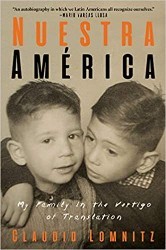
Nuestra América: My Family in the Vertigo of Translation by Claudio Lomnitz
“In order to escape increasing antisemitism in Romania and Ukraine, Misha Adler and Noemi Milstein emigrated to South America in the 1920s. Barely out of their teens and full of early Zionist fervor for socialism and modern Jewish culture, they met and fell in love in Lima, Peru. In the following years, they founded publications and brushed shoulders with luminaries of South American history and literature. They were jailed and freed, parents and public intellectuals, speakers of a dizzying number of languages. They moved frequently from city to city, country to country, continent to continent. They were Eastern European, Latin American, Israeli, and yet, at many times, stateless.
Their grandson, renowned Columbia University anthropologist Claudio Lomnitz, tells their story and that of other family members in this fascinating, fast-moving book. While technically a memoir of Lomnitz’s familial discoveries, Nuestra América often reads more like a history of a little-known type of Jewish diasporic experience.” — Jessie Szalay

I Am of the Tribe of Judah: Poems from Jewish Latin America (edited by Stephen A. Sadow, introduction by Ilan Stavans)
“The first anthology of its kind, I Am of the Tribe of Judah: Poems from Jewish Latin America brings together poetry from the Mexican border to the tip of South America. Originally written in Spanish, Portuguese, Yiddish, Ladino, Casteidish, and Hebrew, these poems have been translated into English, many for the first time, by a group of prize-winning translators.
This multilingual collection looks at the tradition across more than five hundred years, featuring poems that exalt being Jewish, whether Ashkenazi or Sephardic, and poems that express humor and satire. Conversely, there are poems in response to anti-Semitism and poems of exile, of protest, and of the Holocaust. In a different mode, there are wondrous poems on mysticism and Kabbalah.” — From the publisher
Violeta Castro Stolpen (she/her) is the Director of Operations at Jewtina y Co., an organization that shapes inclusive, joyful, and resilient Latin-Jewish communities. Violeta is a seasoned nonprofit management professional and an avid reader with a special interest in 20th century American and Latin American literature. She was born in Guanajuato, Mexico and grew up outside of Philadelphia, Pennsylvania, where she is raising two young Latin-Jewish boys.
